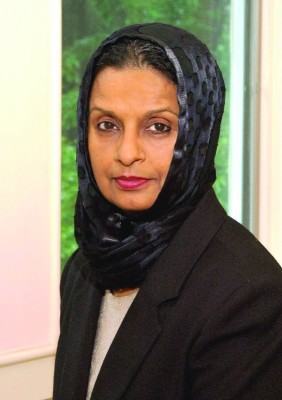SOUTH HADLEY, Mass., Feb. 15 — Shamshad Sheikh was taken aback when she was asked to become the Muslim spiritual adviser to students at Mount Holyoke College. She did not feel qualified.
True, she had obtained a degree in Islamic law almost two decades earlier in her native Pakistan. She had joined a mosque in West Springfield when she arrived in Massachusetts in 1981 to study accounting. She had taught Sunday school for five years.
But a spiritual adviser?
“For that, you have many, many years to go,” Ms. Sheikh said she thought to herself. “A person can devote a whole life to that.”
But Mount Holyoke, a women’s college with an enrollment of 2,000, was having trouble finding a woman to fill the newly created position. So after thinking about it for several days, Ms. Sheik, a soft-spoken mother of a daughter who was then 9 years old, took the 20-hour-a-week post while keeping her other job teaching accounting at a community college.
“I was involved with children at the mosque, so I was already involved in Islamic teaching,” she said, “and I knew there were no other females in the area that could take the job.”
That was in 1997. “They didn’t even have a job description for me,” Ms. Sheikh recalls. She settled on the title “Islamic adviser” and later redefined her role as “adviser to Muslim students and chaplain to the college.”
For colleges and universities, finding Muslim chaplains is often difficult.
Yahya Hendi, an imam, became the first full-time Muslim college chaplain in the United States when Georgetown University in Washington hired him three years ago.
By Mr. Hendi’s count, 27 colleges have Muslim chaplains, most of whom serve part time or as volunteers and, like Ms. Sheikh, started with little religious training. Because colleges and universities are scrambling to meet the needs of growing numbers of Muslim students, “they are just hiring anyone,” Mr. Hendi said.
A few months ago Mr. Hendi, 35, was part of a group that convened to form the National Muslim Chaplains in Higher Education Council, which is seeking to ensure that chaplains at colleges and universities are adequately trained.
Jane I. Smith is a professor in a program begun last September at the Hartford Seminary in Connecticut to train Muslim chaplains, primarily for institutions like schools, hospitals, prisons and the military. Professor Smith said her seminary faced a twofold challenge: to train Muslims who can teach their faith in what she calls “the American context” and to bring more women into leadership roles in a religion where women are as yet unable to lead a mosque as an imam.
Professor Smith likens the nascent debate among Muslims worldwide over allowing women to become imams to arguments among Roman Catholics about whether to ordain women. In designing the program she and her colleagues chose the word “chaplaincy” to describe the training that leads to a master of divinity degree so it would be open and welcoming to women.
Soon after the Sept. 11 terrorist attacks, Mount Holyoke shifted Ms. Sheikh, 42, to full-time status in recognition of the hours she was devoting to seeing Muslim students and to fielding inquiries from their parents, many of whom live abroad. She also explains Islam to the rest of the campus community through speaking events, a weekly session she offers on the basics of the religion, and individual meetings.
Every Friday Ms. Sheikh, who wears a traditional Pakistani tunic over baggy trousers, holds a lunch where a meal prepared according to Islamic dietary rules is followed by a group discussion and prayers. Two women in her mosque take turns cooking, and Ms. Sheikh picks up the food on her way to work.
As students enter the lounge in Eliot House, where the college’s Center for Religious Life is based, they encounter a table with leaflets and fliers, including a chart of prayer times calibrated to when the sun rises and sets in New England. About a quarter of the 112 Muslim students at Mount Holyoke fasted during the holy month of Ramadan; a handful, including Ms. Sheikh, pray five times a day.
The women gather on couches arranged in a circle in the middle of the room to eat and talk, before going downstairs to a carpeted room adjoining Ms. Sheikh’s office to pray.
Sawsan Eskander, a senior from Bangladesh majoring in mathematics, said the fact that the college advertised a Muslim chaplain in its brochure “had a major influence in me coming to Mount Holyoke.”
Last fall the college opened a combination kosher and halal dining hall, where observant Jews and Muslims can eat all their meals.
“My dad read about the juma prayers and the halal food,” said Ms. Eskander, 21. “He didn’t imagine I would get a religious environment in the United States.”
Andrea Ayvazian, Mount Holyoke’s dean of religious life, said her colleagues realized when they hired Ms. Sheikh that “we could either look for an imam or what Christians call a lay leader.” Now Ms. Ayvazian would like Ms. Sheikh to further her religious studies.
“I am encouraging her very, very strongly because I want her to get that degree,” she said.
Professor Smith, of the Hartford Seminary, said that as the number of Muslims increased in the United States, “there is a need for training indigenous leaders who know the American context.” But where those people will come from is “up for grabs,” she said. “This is a new and very interesting part of religious history in America.”




